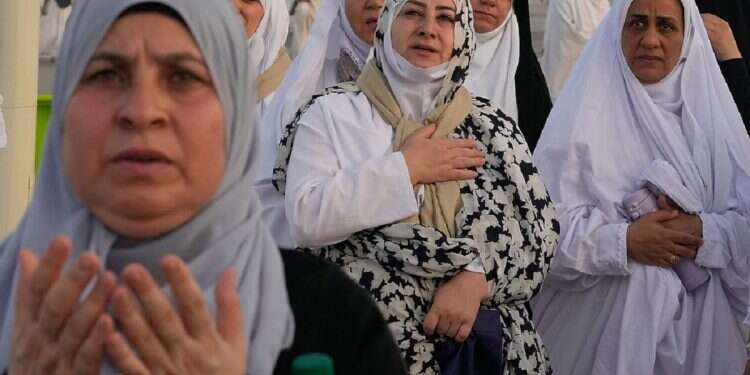More than 1.83 million Muslims from around the world congregated on Saturday for the annual Hajj pilgrimage in Saudi Arabia for worship and reflection.
Staving off potential protests or chants about the war during the Hajj, Saudi authorities said they won't tolerate politicizing the pilgrimage. In his sermon Saturday at the sprawling, six-minaret Namera mosque in Arafat, Saudi cleric Maher Bin Hamad al-Mu'aiqly, also cautioned about politicizing Hajj.
However, some have not listened to his message. Videos surfaced from the pilgrimage site of Iranian men and women politicizing the holy event. Chanting "Death to Israel" and "Death to America" and holding up placards of hate, criticizing the war in Gaza.
Video: Iranian Hajj pilgrims chanted 'Death to Israel' and 'Death to America' / Credit: X
The ritual at Mount Arafat, known as the hill of mercy, is considered the peak of the Hajj pilgrimage. It is often the most memorable for pilgrims, who stand together asking God for mercy, blessings, prosperity, and good health. It's believed that Prophet Muhammad delivered his final speech, known as the "Farewell Sermon," at Mount Arafat 1,435 years ago. In the sermon, the prophet called for equality and unity among Muslims. The hill is about 20 kilometers (12 miles) southeast of Mecca.
Hajj is one of the largest religious gatherings on earth. The rituals officially started Friday when pilgrims moved from Mecca's Grand Mosque to Mina, a desert plain just outside the city. The pilgrimage is one of the Five Pillars of Islam. All Muslims are required to make the five-day Hajj at least once in their lives if they are physically and financially able to do so. The rituals largely commemorate the Quran's accounts of Prophet Ibrahim, his son, Prophet Ismail, and Ismail's mother Hajar – or Abraham, Ishmael, and Hagar as they are named in the Bible.
This year's Hajj came against the backdrop of the Israel-Hamas war, which pushed the Middle East to the brink of a regional conflict. Palestinians in the Gaza Strip weren't able to travel to Mecca for Hajj this year because of the closure of the Rafah crossing in May, when Israel extended its ground offensive to the city on the border with Egypt.
Iranian Hajj pilgrims chanted "Death to Israel" and held "Death to America" placards during the annual pilgrimage in Saudi Arabia, despite Riyadh authorities warning against any political slogans, a video published by IRGC-affiliated outlets shows. pic.twitter.com/WaCHpAhPRx
— Iran International English (@IranIntl_En) June 15, 2024
At sunset Saturday, pilgrims left Mount Arafat, heading to a nearby site known as Muzdalifa to collect pebbles that they will use in the symbolic stoning of pillars representing the devil back in Mina. Pilgrims then return to Mina for three days, coinciding with the festive Eid al-Adha holiday, when financially able Muslims around the world slaughter livestock and distribute the meat to poor people. Afterward, they return to Mecca for a final circumambulation, known as Farewell Tawaf.
Once the Hajj is over, men are expected to shave their heads, and women to snip a lock of hair in a sign of renewal. Most pilgrims then leave Mecca for Medina, about 340 kilometers (210 miles) away, to pray in prophet Muhammad's tomb, the Sacred Chamber. The tomb is part of the prophet's mosque, which is one of the three holiest sites in Islam, along with the Grand Mosque in Mecca and the Al Aqsa Mosque in Jerusalem.




